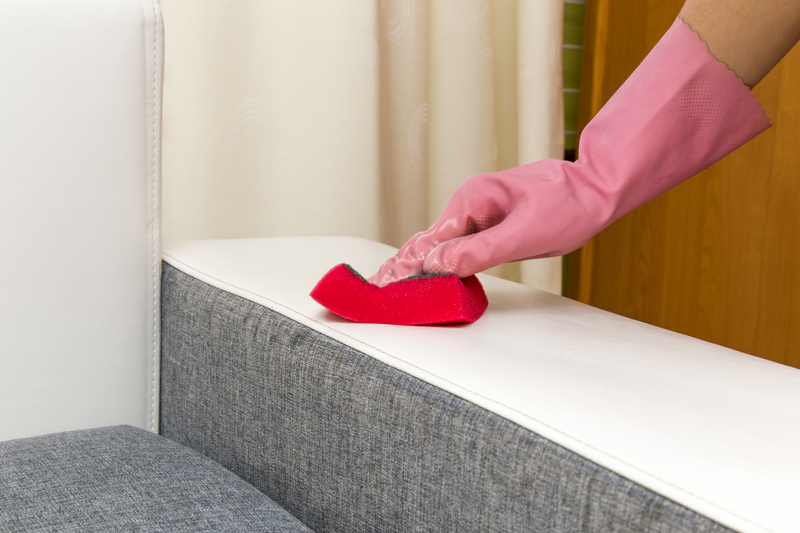Combat Damp Smells with These Tricks
Posted on 30/05/2025
Combat Damp Smells with These Tricks: The Ultimate Guide to a Fresher Home
Are you battling persistent musty odors in your home? Does your basement, bathroom, or bedroom often smell damp despite regular cleaning? Combating damp smells can be challenging, but with the right techniques, you can eliminate unpleasant odors and maintain a healthier, fresher living space. In this detailed guide, you'll discover effective tricks to get rid of dampness, prevent future problems, and enjoy a home that always smells fresh!
Understanding Damp Smells: What's Causing the Odor?
Before tackling damp room odors, it's crucial to recognize where they come from. Damp or musty smells are generally signs of excess moisture, which can lead to the growth of mold and mildew. These fungi release volatile organic compounds (VOCs) that create the distinctive, unpleasant odor many homeowners dread.
- Mold and Mildew: Thrive in dark, moist, warm places and are the main causes of musty smells.
- Poor Ventilation: Insufficient air circulation encourages moisture buildup, leading to dampness and related odors.
- Leaking Pipes or Roofs: Any hidden leaks can saturate building materials, creating a prime environment for odor-causing organisms.
- Condensation: Windows, walls, or uninsulated surfaces may collect condensation, which in turn promotes mold growth.
Recognizing the sources of dampness is the first step in your fight to combat damp smells.

The Health Impacts of Persistent Damp Odors
Eliminating musty odors isn't just about comfort--prolonged exposure to damp environments can have negative health effects. Allergies, respiratory problems, headaches, and even exacerbated asthma are linked to living with mold and mildew.
- Allergic Reactions: Mold spores can trigger sneezing, itching, and watery eyes.
- Respiratory Issues: Inhalation of mold spores aggravates asthma and breathing difficulties.
- General Discomfort: Headaches, fatigue, and irritability may result from lingering odors and poor air quality.
Combating damp odors is essential for your family's health and peace of mind.
Tricks to Combat Damp Smells and Freshen Your Home
Ready to neutralize musty smells? Try these proven strategies for fighting odor, drying out damp areas, and keeping your home smelling clean and inviting!
1. Identify and Address the Moisture Source
- Check for Leaks: Regularly inspect pipes, roofs, windows, and walls for any signs of water intrusion.
- Seal cracks and gaps with proper materials to prevent future moisture entry.
- Consider using a professional if you suspect hidden leaks or drainage problems.
2. Improve Ventilation
- Open windows and doors whenever possible to boost air flow.
- Use exhaust fans in kitchens, bathrooms, and laundry rooms to remove humid air.
- Install ceiling fans or portable fans in poorly ventilated rooms.
An adequately ventilated home is less likely to develop lingering damp room smells.
3. Use Dehumidifiers and Moisture Absorbers
- Dehumidifiers: Invest in a quality dehumidifier to maintain optimal indoor humidity (ideally between 30-50%).
- Place dehumidifiers in basements, bathrooms, or any space that frequently feels damp.
- For smaller areas (closets, cabinets), use moisture-absorbing crystals or silica gel packs.
4. Clean and Dry Soft Furnishings
- Wash curtains, bedding, rugs, and upholstery regularly, as these items can trap moisture and harbor odors.
- Let items dry completely--outdoors, if possible. Sunlight is a natural mold and odor fighter!
5. Tackle Carpets and Flooring
- For persistently damp carpets, clean them thoroughly with a carpet cleaner and use a dehumidifier to speed drying.
- If odors persist, consider professional cleaning or replacing affected sections.
- Hard floors can be mopped with diluted vinegar, a natural deodorizer and mold inhibitor.
6. Remove Mold and Mildew Promptly
- Scrub visible mold with a mix of water and detergent. A solution of white vinegar or diluted bleach can help disinfect and prevent regrowth.
- For severe infestations, contact a professional mold remediation service.
- Dispose of any items (like old boxes, papers, or textiles) that can't be thoroughly dried or cleaned.
7. Harness the Power of Natural Odor Absorbers
- Baking Soda: Place bowls of baking soda in affected areas to neutralize damp smells.
- Activated charcoal and coffee grounds are also excellent natural deodorizers.
- Dried lavender, rosemary, or sachets of other drying herbs can add a pleasant, natural fragrance while fighting moisture.
8. Try DIY Air Fresheners
- Simmer a pot of water with citrus peels, cloves, or cinnamon to freshen up your space.
- Use essential oil diffusers with anti-microbial scents like eucalyptus, tea tree, or lemon.
- Refresh closets or drawers with homemade sachets filled with dried herbs or baking soda.
While air fresheners do not remove the source of odor, they can help mask minor mustiness during and after treatment.
Expert Tips to Prevent Damp Odors in the Future
- Insulate problem areas such as basements, attics, and garages to discourage condensation.
- Regularly check for signs of water damage--peeling paint, bubbled wallpaper, or suspicious stains.
- Store items in airtight bins in potentially damp locations, such as basements or sheds.
- Clean filters and ducts for HVAC systems to prevent moisture buildup and odors.
- Keep gutters, downspouts, and drainage systems clear and in good repair.
Proactive maintenance is the best way to combat damp smells and prevent their return.
Natural Solutions for Damp Room Odors: Safe, Eco-Friendly Remediation
Many homeowners prefer natural remedies to combat musty odors without harsh chemicals. Some of the best household options include:
- Baking Soda: Versatile, affordable, and safe--even great for deodorizing shoes, closets, and laundry hampers.
- White Vinegar: Inexpensive and highly effective at neutralizing odors and killing mold.
- Lemon Juice: Offers a fresh scent and mild antibacterial properties for cleaning surfaces.
- Essential Oils: Tea tree, lavender, and eucalyptus are all known for their antifungal properties.
Tip: Mix a tablespoon of baking soda with a few drops of essential oil and sprinkle it on carpets or fabric furniture. Wait 15-20 minutes, then vacuum away the odors!
When Should You Call a Professional?
Sometimes, damp smells in a home indicate severe water damage or mold contamination. If you notice the following, it may be time to call in experts:
- Extensive visible mold--especially on walls, ceilings, or HVAC systems
- Persistent, overwhelming odors that don't improve despite your efforts
- Health symptoms such as worsened allergies or breathing difficulties among household members
- Ongoing leaks or flooding issues
Professional mold remediation or waterproofing services ensure thorough, safe removal and lasting solutions for your home.

Frequently Asked Questions About Damp Odors
Why does my home always smell musty, even after cleaning?
Persistent musty smells typically mean hidden moisture, which cleaning alone can't address. Check for leaks, poor ventilation, or damp items absorbing moisture. Remove the underlying cause to banish damp room odors for good.
Do air fresheners get rid of damp smells?
While air fresheners may cover odors temporarily, they don't resolve the source. For effective damp odor removal, use fresheners after tackling moisture and cleaning affected areas.
Is it safe to use bleach on mold and mildew?
Bleach can kill some types of surface mold, but must be used with caution--never mix with ammonia or other cleaners. Always wear gloves and keep the area ventilated. For large or stubborn mold, contact professionals.
How can I prevent damp smells in my rental apartment?
- Keep furniture away from exterior walls to enhance airflow.
- Avoid drying clothes indoors without proper ventilation.
- Report leaks or water damage to your landlord promptly.
- Use portable dehumidifiers and natural odor absorbers as needed.
Conclusion: Enjoy a Fresher, Healthier Home by Combating Damp Smells
Lingering damp odors can make any home feel unwelcoming, but they don't have to be permanent. By identifying moisture sources, improving ventilation, and using proven cleaning and deodorizing tricks, you can combat damp smells at the source. Not only will your home smell sweeter, but you'll also promote better health and comfort for your entire household. Armed with these strategies, enjoy a fresh, inviting living space all year round!
Looking for more smart home tips? Bookmark this guide or share it with friends battling damp and musty smells in their homes!




